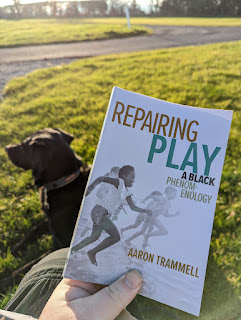Just finished reading "Repairing Play" by Aaron Trammell and I have thoughts! I agree with much that Aaron writes, but disagree with a bit too, which is fair enough... really enjoyed reading it!
More importantly to me, I wonder if the stuff I disagree with comes down to our definitions of play, partly because of my different experiences of play as an autistic person, which is different again to some "mainstream" play theorists?
I have to note as well that the author takes a very US centric approach to this book, which I've tried to forgive, but is undoubtedly niggling me anyway (though he does briefly acknowledge this, so bonus points for this).
So... onto my proper thoughts...
A core part of the book argues that play can be non-consensual, a conflict with traditional play theorists, who say it is always consensual / voluntary. So he says that bullying, torture, police brutality should all count as play... whereas most play theorists would say that they are not. He argues that play is overwhelmingly seen as positive, but it should equally be seen as potentially negative.
I wonder is this is where I bring my own experiences in a way that is different again? Maybe this is an autistic thing and neurotypical people have a 3rd way that Aaron sees as the norm in play theory?
He counts play as an act that is possible to do to someone else, so the tortured and torturer are playing, the bullied and the bully. I think that he's saying that normally we wouldn't class things like torture as play, but that we should do. I've always seen it slightly differently - the torturer, the bully, the toxic manager, the brutal police officer, can absolutely be playing. Playing as an individual, or as part of a group (that deliberately excludes others), but the person involuntarily suffering as part of it is definitely not playing - to be playing they'd have to be voluntarily taking part, so for example, BDSM would count, but not being involuntarily tortured!
Is this because I'm comfortable that in any activity I recognise that some people may well be playing, some just going through the motions? That the mental state is as important as what is happening at face value? (Or perhaps it's because Aaron comes from game studies, so the game, the structure is the key thing, so can be done to others? I don't know...)
Equally I might be playing in my own head, approaching an activity in a way that makes it play, with others being completely unaware of others - play is much more likely to be an individual activity for me, though the idea that play is inherently social pops up all the time in the play literature.
So this different way of thinking about play is where I think we differ - I wonder if just as his way of thinking about play is heavily influenced by a mixture of game studies and US Black history (and current experiences), so is mine influenced by Autistic play, even though I haven't really thought about it in this way before!
I know this doesn't get onto his idea of repairing play and is probably a bit of a side issue, but it made me wonder about something quite different to the ideas he covers in the book - whether the autistic experience of play is something else again, which I found quite interesting personally! So where I've read between the lines of traditional play theories and assumed one thing (based on my own experiences of play), other people are taking quite a different set of assumptions from it - which Aaron has flagged up by taking a third :)
I really need to find time to dig into neurodivergent ideas of play in adults at some point! Rather than people writing about children's play, which always feels to me like "how do we use play to fix these children" :-S
